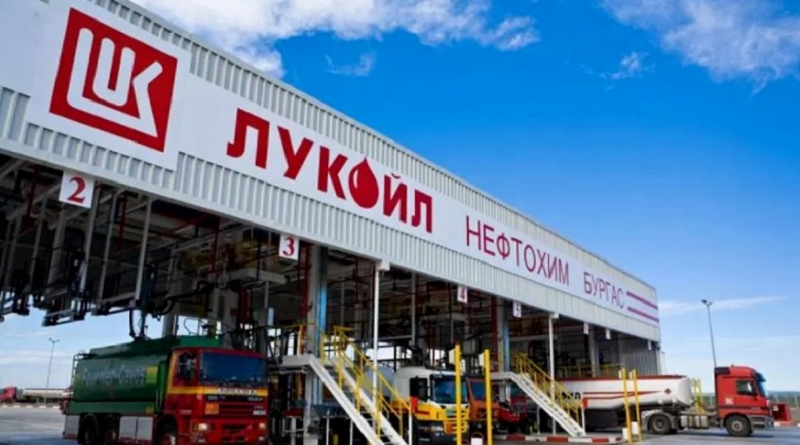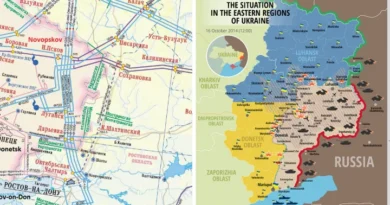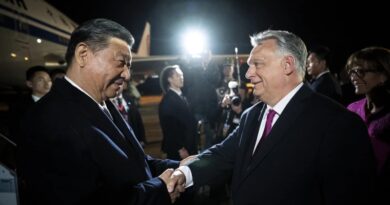Much ado about… something
Ilian Vassilev
Recent fuss in the media and among Russian parliamentarians about Lukoil’s “treasonable” supply of fuel to the Ukrainian army has been a storm in a teacup. Lukoil’s Bulgarian refinery – the jewel in the crown of its vanishing European empire – is doing precisely what Russian president Vladimir Putin wants it to do, given the EU derogation it enjoys. The really important question is what Mr Putin would do if Bulgaria’s government got tough and insisted that Bulgarian consumers – and not the man in the Kremlin – got the benefit of the “Urals-Brent discount” arising from EU sanctions and the refinery’s exemption. My answer to that question, argued here, is: he probably wouldn’t do very much at all. It’s a pretty safe step – and should be taken.
Just now, Lukoil Neftochim in the Bulgarian city of Bourgas – the largest oil refinery in the Balkans – is enjoying the best days in its history in terms of revenues and profits. The Russian company is benefitting from a derogation that gives it the exclusive right to process Russian oil. That is worthy of a more detailed analysis.
Recently, the refinery made media history in Russia and Bulgaria, following revelations by the online edition of Germany’s Die Welt that refined products made from Russian crude had accounted for up to 35% of the Ukrainian army’s supply of gasoil (essentially the diesel fuel used by heavy vehicles). This immediately brought the topic into the limelight in the Russian and Bulgarian media – and prompted some harsh talk from Vyacheslav Volodin, the Speaker of the State Duma (the lower house of Russia’s parliament), who called for an investigation of Lukoil for treason.
It’s all in the plan
Now, Lukoil denies that it is supplying Ukraine directly. And that may be true, or mostly true. The fact that the fuels produced in the Bourgas refinery are in great demand in the region does not necessarily mean that there are direct supplies to the Ukrainian army. But that’s of limited relevance. As with arms and munitions deliveries, so with oil products. Lukoil’s refined products are sold to wholesalers. And presumably it’s those wholesalers who are selling to Ukraine.
But don’t be fooled. Lukoil’s management regularly briefs the Kremlin and Russia’s intelligence services (though maybe not Mr Volodin) on the extent and nature of the company’s exports and operations. The idea that Russian crude oil supply chains are not under Russian president Vladimir Putin’s control is just plain laughable. Since the retirement of long-serving Lukoil boss Vagit Alekperov – interestingly less than two months after Russia’s invasion of Ukraine – the company has been under the Kremlin’s direct (and tight) control.
Which suggests an obvious question: if the powers that be have known about it all along, how come Russian crude has been ending up as fuel for the Ukrainian army, as Die Welt alleges? The answer is simple: it has been happening because Mr Putin has had an overwhelming interest in it happening – and has been allowing it to happen. Just as he allows Gazprom to transit natural gas through Ukraine: even now, between 30 and 40 million cubic metres is passing through ‘enemy’ territory every day, though that is less than a tenth of previous volumes.
Currently, Lukoil’s refinery in Bourgas is the jewel in Lukoil’s crown in terms of returns on capital – measured as net revenues and contributions to the Russian budget and net income per barrel (bbl) of crude oil exported – and not just of crude sales proceeds, refining fees and trade. The secret is this: the special status of Lukoil’s EU arm, Litasco, along with the derogation that has been granted, allows it to pocket the discount on Urals-grade crude (relative to Brent-grade), that is normally, in effect, exacted on Urals imports. That discount at present is $32/bbl, or 40% of Brent oil price.
These articles analyses and comments are made possible thanks to your empathy and contributions, which are the only guarantors of independence and objectivity in our work. The Alternatives and Analysis team.
It works like this: the price at which the Urals crude imported by Litasco enters Bulgaria is that of Brent minus a few dollars, the precise size of that “minus” being agreed in advance between the tax authorities and Lukoil. It’s quite a clever cosmetic and media operation. On the one hand, it allows the Bulgarian politicians acting as Lukoil’s fixers to claim that Neftochim’s refined products are among the lowest-priced in the EU. On the other hand, it simultaneously gives Lukoil’s managers grounds to claim that they are complying with President Putin’s decrees – as sales of Urals take place above the EU’s $60/bbl ceiling. Meaning that Bulgaria, even though it is on the Kremlin’s “non-friendly countries” list, is paying what Lukoil wants and not what the EU says.
Financially, Mr Putin’s hands-off attitude makes sense. Consider the figures. Every month the refinery processes more than 5.5 million bbl of Urals-grade crude oil, whose Urals-Brent discount is estimated to be worth some $200 million. Just think what being spared that $32/bbl means, when the sale price of Urals shipments to India is $42/bbl (all current prices). It’s a pretty nice margin. And a nice addition to Mr Putin’s war-chest.
All that explains something else too. Lukoil is looking for buyers of its stakes in all the EU-based refineries it controls – except the one in Bourgas. That’s too precious as an asset for the Kremlin. Not only for financial reasons. But also because it essentially underwrites Russian control and influence in Bulgaria and regionally.
Back to all that parliamentary and media fuss in Moscow, however: incendiary talk of Lukoil’s betrayal was fairly short-lived, with the mass media going quiet of their own accord once Russian lawmakers received “intelligence” from foreign minister Sergey Lavrov’s office and the Kremlin. There are still ongoing investigations. And, as recently as February 17th, Konstantin Zatulin – First Deputy Chairman of the CIS Committee of the Duma, no less – renewed his appeal for a thorough investigation into the role of Lukoil’s Bourgas refinery in providing essential supplies for the Ukrainian army. But, for practical purposes, the storm has been weathered.
Derogatory terms
Essentially the Kremlin has given semi-public acknowledgement to its special treatment of Lukoil, on the implicit grounds that its Bourgas refinery enjoys a derogation from EU sanctions. The sanctions waiver provides a rare opportunity and a legal base for the Russian company’s activities in the EU, at least until the end of 2024, as well as extra revenue, on an exclusive basis for Lukoil and the Russian state.
It’s a highly cynical reality. On the one side, Russia benefits from the largest refinery in the EU still under Russian control, securing a regular monthly flow of $500 million to Russia, if you count the value of the oil sold as well as the Urals-Brent discount unpaid. On the other side, the Ukrainian army receives sufficient fuel supplies – and Lukoil Neftochim seems vital for that, as Ukrainian refineries have been shut down during the war.
So there’s something for everyone. Except for Bulgarian consumers. At least half of that $500 million comes mainly from their pockets. They are paying $200 million more than they would be paying for their fuel if they were getting the full benefit of that Urals-Brent discount. Which they should be getting.
Characteristically, the reactions to this strange situation in Bulgaria have been belated, mild and to a large extent cosmetic.
There’s the quaintly-named Commission for the Protection of Competition (CPC) – the nicely ambiguous phrase “anti-trust commission” seems far more apt. It eventually got round to investigating the refinery for abuse of Lukoil’s dominant position. Result: a €34 million fine. That’s just a tad smaller than it might have been, given that the maximum penalty is 15% of annual revenues – and that revenues topped $6 billion last year! And the situation is even more ludicrous than that: for no-one really expects the fine to be paid. In all previous instances involving Lukoil, the Supreme Administrative Court (SAC) has overruled the CPC decisions imposing fines. Very likely the SAC will run true to form this time too.
And there’s the €46 million advance profit tax payment the refinery volunteered to pay at the end of 2022. Well, that’s nice. But it’s similarly small change in the general scheme of things. And, of course, it’s a cost brought forward, not an additional cost for Lukoil. It’s hard to avoid the impression that, like the CPC, Lukoil Neftochim is mostly engaged in creating smokescreens rather than seriously addressing problems.
What is to be done?
Now, the Bulgarian state’s powers of intervention are (mercifully) not confined to potential action by the CPC. In December 2022, the country’s last parliament adopted legislative changes, modelling them on analogous legislation in Germany and Italy, and giving the government certain emergency powers for action in the refinery.
Suppose Vladimir Putin were to cut off crude oil exports to “unfriendly countries”, for instance. This law would allow the Bulgarian government to take over operational control of the refinery to ensure the continuity of the production process and meet market demand for crude oil. Which is good news, but much easier said than done. It would be a huge challenge for the government not only to find a backup management team of experienced professionals, but also to secure a significant supply of non-Russian crude – in effect, a tanker-full every two or three days.
In the Black Sea, non-Russian – Kazakh and Azeri – crude oil is available via two outlets, the Georgian port of Supsa and the various terminals near the Russian port of Novorossiysk. Nether seems very promising.
The problem with Supsa is that volumes of crude would, at least in the short term, be very modest. The Supsa terminal has a capacity of just 2 million tonnes per year (maybe a third of Lukoil Neftochim’s annual throughput). And the capacity of the Baku-Supsa pipeline is also limited. These shortcomings could be remedied relatively easily – though with some delay. But long-term contracts (and the close encounters leading to them) with Kazakh and especially Azeri governments and companies would be needed to secure additional quantities. These things always take time – time perhaps lengthened by the political delicacy of the task for countries still living in Russia’s shadow, if not its sphere of influence. And there’s no guarantee that infrastructure developments and contract negotiations would proceed simultaneously rather than sequentially. So the notion of swift “emergency” action to secure supplies is optimistic, to say the least.
As to Novorossiysk, the problem is obvious. Yes, Kazakh oil can and sometimes does pass through there. But it’s extremely unlikely that, in the hypothetical situation, the Russian authorities would not resort again to the familiar exercise of finding “technical” obstacles as an excuse for an effective ban on its export.
There might (or might not) eventually be a third no-quick-fix option: the recently proposed Alexandroupolis-Burgas pipeline. If it happens – and pipelines of that size have a way of not happening – it would take time. And it would hardly offer anything new as a solution to familiar problems. It might be desirable for the duration of Mr Putin’s war if, magically, it could be put in place instantly. But without the war, it’s just a more expensive option than securing Caspian Sea crude oil via the Black Sea. And it will always need to compete with the Bosphorus route and a potential bypass. The war won’t last forever. Nor, indeed, will Mr Putin’s dismal rule in Russia, which underpins the war and necessitated special restrictions in the first place.
But will Putin play hardball?
Nevertheless, securing alternative crude oil supplies is not an insurmountable obstacle, even under extreme scenarios. But it does require proper attention, hard work and a certain amount of forward (and contingency) planning. As in the case with Gazprom’s supply cut-offs, our government can count on the support of key NATO allies in this respect with simultaneous action in:
- securing greater crude oil supplies via Georgia;
- encouraging a change of ownership of the refinery that could attract international players and mitigate the Russian political risk;
- securing allied technical assistance and personnel relevant to running a refinery – a troublesome non-core duty for a government! That would certainly be forthcoming, since the Bourgas refinery is a key strategic asset in the Black Sea region for NATO.
So that isn’t – or needn’t be – a worry. No, the really pertinent questions are these:
- First, is the Bulgarian government going to impose its will, ensuring that the Urals-Brent discount is reflected fully in the pumps price of fuels, thus lowering inflation? That’s pretty important in itself. But it’s especially relevant because inflation is a critical indicator in advance of Bulgaria’s Eurozone accession, for which a date of 2024 should seem still feasible.
- And, second, would such a move provoke the Kremlin to halt supplies to the Bourgas refinery? Or even, perhaps, to treat Lukoil Neftochim in the same way as all the other Russian refineries in Europe – and prepare to sell it?
Reasons to be cheerful (and bold)
Of course, no one can really claim to understand Mr Putin’s thought processes or predict their outcomes. But I think a shrewd guess is possible, given that several considerations point in the same direction:
- Lukoil’s ownership of the refinery in Bourgas is a precious strategic asset for Russia in terms of influence not only in Bulgaria but the region, and Mr Putin is very attuned to influence factors.
- Given that derogation, it’s also one of very few routes that Russia has left for selling crude oil and refined products into the EU market. And that’s not a thing to be sacrificed lightly – even if the refinery is no longer pocketing the Urals-Brent discount.
- A decision taken for short-term reasons would have very long-term implications that Mr Putin is unlikely to countenance. He’s hardly going to just walk away from the Bourgas refinery – that’s just too much for a poor Bulgarian to hope for! But cutting off its oil supply would probably have much the same effect. It would push the Bulgarian government into making a forced change of ownership, and not on terms favourable to Russia. Damage suits would be involved, and also perhaps debt-equity swaps. And it’s not obvious how Russia could hope to enforce even justified claims until the international situation had normalised – if then. But aside from all that, a definitive loss of the Bourgas refinery would be the loss, forever, of a key lever of influence on Bulgaria. Arguably, Russia would essentially have lost Bulgaria.
- Finally, the short-term net effect would be negligible. Things would, for a time, become more complicated for the refinery and for the Ukrainian army. But both would find alternative sources of supply, with the refinery gradually building up market share as end-consumers – in Bulgaria and Ukraine – gained in price competitiveness, again due to the Urals-Brent discount being factored into the equation.
To sum up, it seems very unlikely that Mr Putin would choose to play hardball. To mix my metaphors, to do so would be to kill the goose that lays the golden eggs. So let’s move on and bestow the full amount of the crude oil market boon that’s on offer on Bulgarian consumers. And not on Mr Putin.




